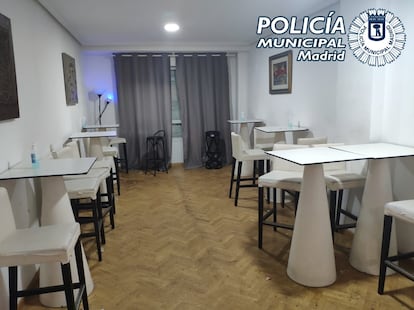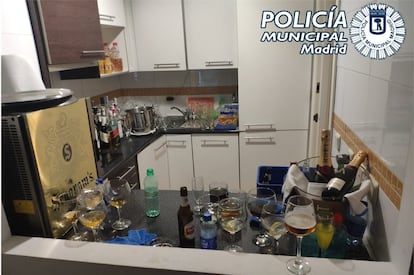Police find crowd of 75 at clandestine bar and brothel in Madrid
No Covid-19 safety measures were being observed, and the premises lacked a license of any kind

Two apartments in the Madrid neighborhood of Tetuán have been operating as an unlicensed nighttime bar and brothel. When police entered the premises on Saturday, they found more than 70 people, among them sex workers and clients, not one of whom was observing the coronavirus safety measures. “They weren’t even wearing a face mask,” said a police spokesperson.
The clandestine business was uncovered by two plain clothes officers at 3.40am on Saturday. The officers were walking down Marqués de Viana street to ensure that entertainment venues in the area were meeting coronavirus restrictions, when they were approached by a man who encouraged them to go “upstairs,” where they would find “alcohol, girls and partying.” The man said that he worked in public relations and as a lookout to watch out for the police.
The undercover officers went up to the third floor of the building located at No.11 Marqués de Viana street, which is next door to a well-known strip club that closed down due to the coronavirus restrictions. On the third floor, they found two doors side by side, one leading to an apartment serving as a bar, and the other to a brothel. The doors were open and there was a large number of people standing in the stairwell and on the landing.

The bar area was packed with patrons gathered around high tables and on stools. At the bar, a waitress was serving drinks for €20 a glass. None of the tables were 1.5 meters apart, the safety distance established to prevent coronavirus contagion, but each did have a bottle of hand sanitizer.
In the rooms of the other apartment, around 30 women were allegedly working as prostitutes and offering other types of services. The officers identified themselves as police and reported 75 people, both clients and workers, for breaking coronavirus safety measures, given that no one was wearing a face mask, the tables were not a safe distance apart and the site was open at 3am, which violates the 1am-closure time introduced by the regional government.
The officers also asked to see the manager, who will be reported for running a bar without a license or meeting any of the basic safety requirements of such establishments, such as having emergency exits. The venue had also exceeded the limit on capacity. The owner could face a fine of between €10,000 and €600,000, and the police are also investigating whether to press charges of serious crimes against public health.
The owner of the venue could face a fine of between €10,000 and €600,000
At the end of August, Equality Minister Irene Montero called on regional authorities to close brothels, arguing that contagion at these sites could lead to a “potential rise of positive cases that are difficult to trace.” Health Minister Salvador Illa also called on the regions to strengthen restrictions and stop Covid-19 transmission at these venues, which must obey the same controls as other establishments.
The central administration and the regions have agreed to coordinated action to try to stop the advance of the coronavirus, including a ban on smoking in public places when safe distances cannot be respected, and the closure of bars and restaurants at 1am. Brothels were not specifically mentioned in the new measures, and these establishments present a major problem in terms of contact tracing.
In response to this problem, several regions, including Catalonia, Castilla-La Mancha, the Basque Country, La Rioja and Extremadura, have ordered the closure of brothels – but not Madrid. Last Friday, Madrid’s health chief, Enrique Ruiz Escudero, said that the region could not expressly decree that brothels be closed because it is an “unregulated activity” that falls outside the legal framework.
Prostitution was decriminalized in Spain in 1995, and is not currently illegal. But exploitation such as pimping is punishable under the country’s criminal code. Recent estimates put the revenue of the sex industry in Spain as high as €22.4 billion a year.
English version by Melissa Kitson.
Tu suscripción se está usando en otro dispositivo
¿Quieres añadir otro usuario a tu suscripción?
Si continúas leyendo en este dispositivo, no se podrá leer en el otro.
FlechaTu suscripción se está usando en otro dispositivo y solo puedes acceder a EL PAÍS desde un dispositivo a la vez.
Si quieres compartir tu cuenta, cambia tu suscripción a la modalidad Premium, así podrás añadir otro usuario. Cada uno accederá con su propia cuenta de email, lo que os permitirá personalizar vuestra experiencia en EL PAÍS.
¿Tienes una suscripción de empresa? Accede aquí para contratar más cuentas.
En el caso de no saber quién está usando tu cuenta, te recomendamos cambiar tu contraseña aquí.
Si decides continuar compartiendo tu cuenta, este mensaje se mostrará en tu dispositivo y en el de la otra persona que está usando tu cuenta de forma indefinida, afectando a tu experiencia de lectura. Puedes consultar aquí los términos y condiciones de la suscripción digital.









































